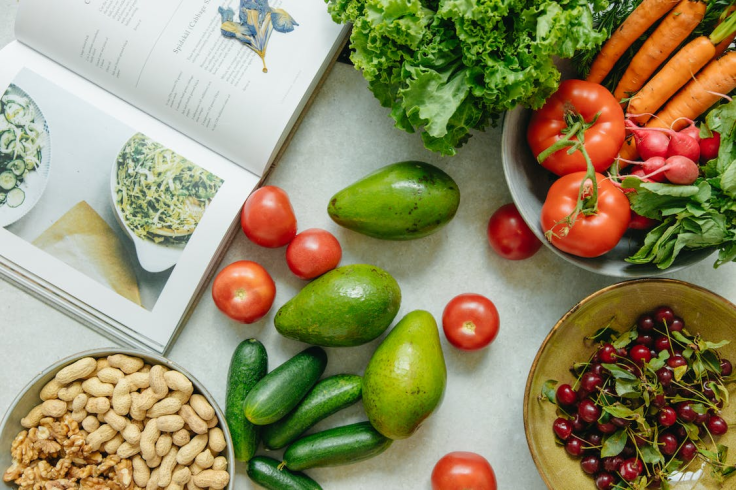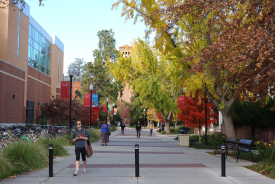AACC's Innovative Cookbook Combats Food Insecurity on Campus, Empowering Palates and Pantries
ByAmid the sobering statistics revealing the prevalence of food insecurity among college students, a beacon of hope emerges from Anne Arundel Community College (AACC) in the form of a student-written cookbook.
This initiative, born out of a collaborative effort by two faculty members, not only addresses the immediate challenges of limited pantry ingredients but also fosters cultural awareness and culinary skills among students. In Fall 2023, Amy Carattini, assistant professor of anthropology, and David "Forrest" Caskey, associate professor of gender and sexuality studies, co-taught the World Culture & Cuisine course, leading to the creation of a resourceful cookbook as a tangible solution to combat food insecurity on campus.

The Alarming Nexus: Food Insecurity and Cooking Skills
The November 2023 report from the Tennessee Higher Education Commission and the Tennessee Student Assistance Corporation underscored a troubling connection - college students' heightened vulnerability to food insecurity due to a lack of cooking skills. Despite the prevalence of food pantries on higher education campuses, students often grapple with the challenge of preparing healthy meals when restricted to pantry ingredients. Recognizing this nexus at Anne Arundel Community College, the faculty members initiated a transformative project within the World Culture & Cuisine course.
AACC's Pantry: Nurturing Bodies and Minds
Anne Arundel Community College's food pantry, established before the pandemic, has evolved from a humble closet to a former office space, symbolizing its growing importance. Caitlin Silver Negrón, AACC's coordinator of inclusive excellence, highlights the pantry's commitment to providing both shelf-safe and refrigerated items. Through a partnership with a produce rescue group, the pantry not only supports visitors with essential groceries but also hosts a pop-up fresh produce market, enhancing the variety and nutritional value of available resources. The pandemic has intensified the demand for these services, showcasing the vital role AACC's pantry plays in supporting the college community.
The Cookbook: A Cultural Feast for All
The heart of the initiative lies in the creation of a student-written cookbook that transcends the traditional boundaries of culinary guides. Students were tasked with sharing recipes from their cultural backgrounds, modified to align with the ingredients available in the campus pantry. The assignment, embedded within the World Culture & Cuisine course, served a dual purpose - encouraging students to reflect on their identity and the profound relationship between food and culture, while also addressing the practical challenges of food insecurity.
The cookbook, conceived as an accessible textbook prioritizing affordability, features recipes that are diverse, rich, and economically viable. With 17 recipes encompassing red meat, chicken, vegetarian, seafood, and desserts, the cookbook becomes a valuable resource for food-insecure students seeking flavorful and nutritious options within budget constraints.
Innovations in Campus Pantries
AACC's cookbook initiative is part of a broader trend in higher education institutions innovating campus pantries to make food resources more accessible. From Virginia Commonwealth University's mini food pantries to Wittenberg University's combined food pantry and career closet, these initiatives aim to address not just immediate nutritional needs but also provide holistic support for students. Pace University's partnership with a local food bank for a mobile market exemplifies the commitment to offering fresh and frozen items, ensuring a well-rounded approach to campus food accessibility.
Beyond Recipes and Ingredients
Sarah Orvis, graphic designer and publicity assistant for the Office of Student Engagement, played a crucial role in bringing the cookbook to life. The digital format, complemented by a QR code for easy access, ensures widespread availability. The cookbook's impact extends beyond its recipes, fostering a space for students to reflect on cooking traditions, family legacies, and the importance of making food more affordable through creative adaptations.
As the course continues, plans are underway to create a second edition of the cookbook, incorporating recipes from the current cohort of students. The success of this initiative goes beyond addressing immediate hunger; it represents a community-driven response to a systemic issue, illustrating how education and creativity can be powerful tools in the fight against food insecurity on college campuses.
© 2025 University Herald, All rights reserved. Do not reproduce without permission.








